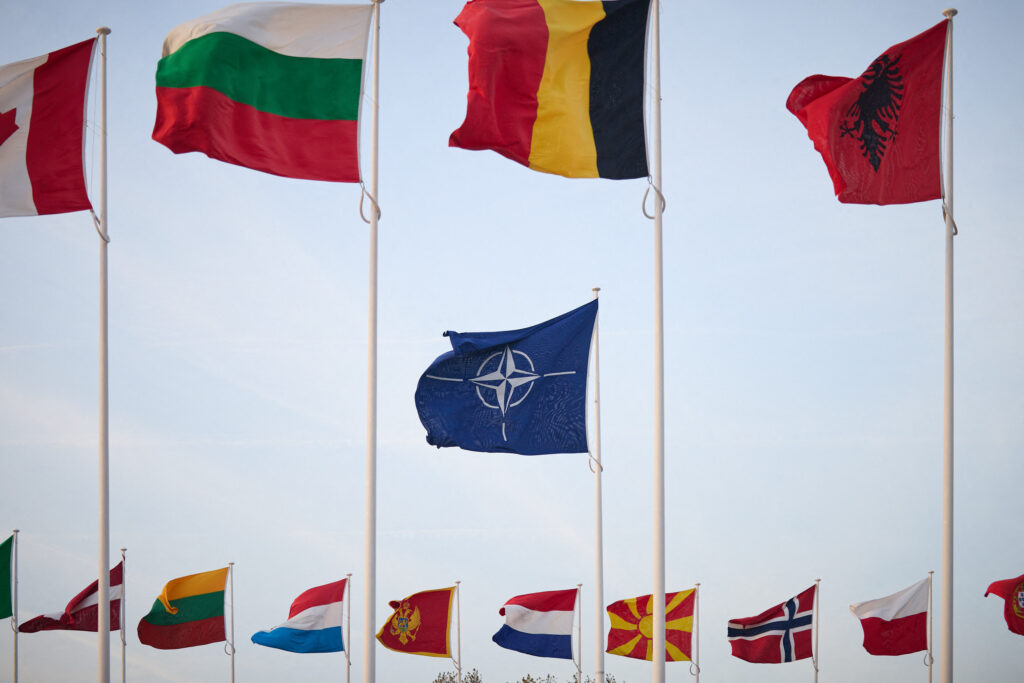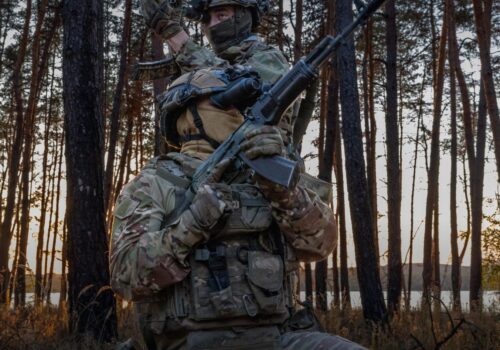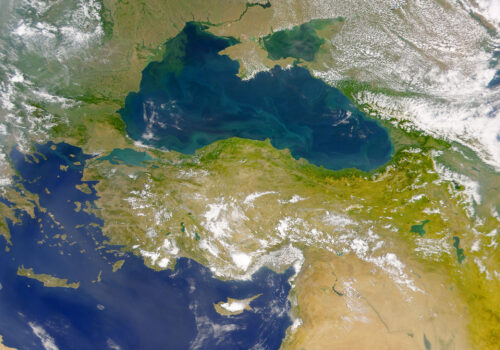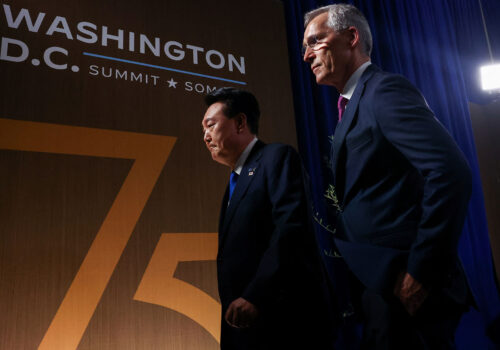Mark Rutte begins his term as NATO secretary general today at an important moment for the Alliance. The seventy-fifth anniversary NATO Summit in Washington in July was a formidable manifestation of the raison d’etre of the transatlantic Alliance and its successes to manage the transformation from the twentieth to the twenty-first century. That’s the good news.
But today Europe is confronted with the most serious situation it has faced in the last seventy-five years. The neorevanchist posture of Russian President Vladimir Putin, peppered again and again with imperial nuclear blackmailing, makes it clear that he is not just aiming to conquer Ukrainian territory. Putin’s narrative that the West has been humiliating Russia repeatedly over the past thirty years is well known. What is new is that today he considers himself militarily strong enough to break the security bond between Europeans and Americans.
Therefore, we, the undersigned, are outlining in this European manifesto why a New NATO is imperative. A Europeanization of NATO is a must to keep the United States on board. Without the United States, NATO will stop existing. And without NATO, Europe’s collective security will collapse. If Europeans then wake up at war with Russia, everyone will be fighting for themselves and no one for the others. Europe will be back where it was a hundred years ago.
What does a New NATO mean, and what needs to be done by Europeans and by Americans?
1. US-European defense industrial integration
First, we need European defense consolidation, a strengthening of the competitiveness and innovativeness of Europe’s military technological and industrial complex and the harmonization of its procurement base. But we also need an acceleration of transatlantic defense consolidation—the United States should integrate its defense capabilities with its NATO allies. This implies friend-sourcing, production diplomacy, and supply-chain resilience.
2. More equitable burden sharing
Second, for the past thirty years Americans and Europeans have been arguing about the necessity of “burden-sharing” within the Alliance. Today burden-sharing is becoming a matter of keeping NATO in business. This means that all thirty-two member states—as applaudable as it is that twenty-three are hitting this year the target of spending 2 percent of gross domestic product (GDP) on the military—must in the near future set up a substantial upgrade of conventional forces on land, in the air, and at sea, with appropriate capabilities to credibly deter a potential aggressor.
For the foreseeable future, this potential aggressor will remain Putin. That means that Europeans would have to provide 50 percent of all conventional forces and strategic capabilities needed to deter and defeat a major-power aggressor. Today, the United States accounts for 68 percent of military spending across the Alliance, while European member states and Canada make up just 32 percent. Such an imbalance is unsustainable for any future US president—not only for a President Donald Trump, who has been most vocal about this—given the new multiple challenges the Americans have to face in Asia or in the Middle East.
The big NATO economic players in Europe—the United Kingdom, France, and Germany—will have to shoulder more of the burden than the smaller countries. The United Kingdom already announced that it plans to increase its defense spending to 2.5 percent. As far as Germany is concerned, West Germany spent 3.5 to 4 percent of its GDP on defense during the Cold War—without becoming a socially poor or militaristic country. The future of the Alliance will decisively depend on the military role Germany is prepared to undertake and its political willingness to take responsibility for a significant increase of its military capabilities to strengthen the European pillar within NATO. That Berlin signed an agreement at the Washington summit that the United States will deploy three land-based medium-range missiles in Germany in 2026 is an important step toward closing NATO capability gaps.
3. An extended European nuclear deterrent
Third, triggered by confused and irresponsible statements by Trump that risk debilitating NATO, an open debate has started in European capitals about an extended credible nuclear European deterrent. To counter Putin’s irresponsible imperialist nuclear blackmailing with his considerable nuclear arsenal, we suggest, as a first step, that Rutte proposes the cancellation of the commitment from the NATO-Russia Founding Act not to deploy nuclear weapons in countries that joined the Alliance after 1997. The rationale for this is clear: Russia has created a reality that did not exist before 1997 by deploying short-range missiles in Belarus and mid-range nuclear-capable Iskander and hypersonic Kinzhal missiles in Kaliningrad, which was a violation of the Intermediate-Range Nuclear Forces (INF) Treaty, exposing NATO’s eastern and northern allies under direct threat.
We suggest as a second step, in order to close the capability gap in relation to Russia’s increasing nuclear armament, that NATO launch a detailed analysis and thorough discussion among allies about the operational and strategic risks and benefits of stationing US tactical nuclear weapons in Poland, Romania, and Bulgaria in response to the developing Russian nuclear doctrine. The Polish debate is ongoing. In July, two US nuclear-capable heavy bombers (B-52s) were deployed to a Romanian NATO military base. In Bulgaria a debate has started behind closed doors.
As a third step, we suggest that Germany should establish a European multinational, rapidly deployable NATO Strike Component Force equipped with US weapons. This proposal would first be directed to the countries of the current nuclear sharing program and would provide for the procurement and deployment of land-based missile systems with ranges of up to two thousand kilometers, air-launched cruise missiles, and submarine-launched short- and medium-range missiles. German submarines could also carry US weapons as such an arrangement would not violate the Nuclear Non-Proliferation Treaty that Berlin has signed.
In a fourth step, we suggest the creation of a new multilateral NATO nuclear planning force group, which will replace the existing NATO nuclear planning group (where France is not a member). The nuclear-sharing countries involved—the United States, the United Kingdom, France (which should join now), Germany, Italy, the Netherlands, Turkey, Poland, Romania, and Bulgaria—would use this setting to coordinate and implement an extended US-European NATO nuclear deterrent policy and to demonstrate to Moscow that collective defense works on conventional as well as on nuclear levels. The message from Rutte to Putin must be made clear: these steps were triggered by Russia’s treaty violations, its war against Ukraine, and its imperial nuclear blackmailing against the West.
The Alliance principle remains unchanged: NATO will continue to act as a defensive Alliance only, protecting against attacks of all sorts of aggression on its territory; but any aggressor should expect immeasurable damage to its territory if it attacks even one inch of a NATO country. At the same time, by closing NATO’s capability gaps, the door for potential arms control discussions with Russia can reopen: this is the positive message Rutte can deliver to Putin.
No doubt, in the future the “transatlantic cohabitation” will become more demanding, but also more mature, not only within NATO. The United States knows very well that NATO and other political-military alliances aren’t acts of charity. Nor was the Alliance created by the United States because of warm feelings for the Europeans. The NATO Alliance serves vital European security interests and hard US national security interests. To abandon NATO would mean that Washington is abandoning and undermining its status as a global power. We trust that every US president understands that.
Signatories in alphabetical order:
Elmar Brok, former chairman of the European Parliament Committee on Foreign Affairs; senior fellow at the Aspen Institute Germany
Charles Grant, co-founder and director of the Centre for European Reform; former Brussels bureau chief and defense editor of the Economist
Istvan Gyarmati, former deputy minister of defense of Hungary; university professor; initiator of the NATO manifesto
Toomas Ilves, former president of Estonia
Aleksander Kwasniewski, former president of Poland
Jacques Lanxade, former joint chief of staff of the French Armed Forces; former defense advisor to President Francois Mitterrand
Denis MacShane, former Europe minister for the United Kingdom; former Labour member of parliament
Margarita Mathiopoulos, CEO, Aspide Technology; professor emerita of US foreign and security policy at Potsdam University; foreign policy advisor to the chairman of the German Free Democratic Party 2002-2011; initiator of the NATO manifesto
Nadeshda Michailova, former minister of foreign affairs of Bulgaria
Klaus Naumann, former chairman of the Military Committee of NATO; former joint chief of staff of the German Armed Forces; initiator of the NATO manifesto
Eduardo Serra Rexach, former minister of foreign affairs and former minister of defense of Spain
Mihai Razvan Ungureanu, former prime minister and former minister of foreign affairs of Romania
Rob de Wijk, founder of The Hague Centre for Strategic Studies; professor of international relations and security at Leiden University and professor of international relations at the Royal Netherlands Military Academy
Further reading
Wed, Sep 18, 2024
Dispatch from Kyiv: The Kursk offensive is working, but Ukrainians are worried about US wobbling
New Atlanticist By John E. Herbst
Morale in Kyiv has been boosted by the early success of the incursion into Kursk, but tempered by concerns over US support.
Fri, Sep 13, 2024
A sea of opportunities: Exploring cooperation between Turkey and the West in the Black Sea
Report By
In the political sphere, the interests of Turkey and the West in the Black Sea largely overlap.
Wed, Sep 11, 2024
A next-generation agenda: Bridging Indo-Pacific and European perspectives on security
Issue Brief By
This next generation agenda proposes policy recommendations designed to improve security cooperation among the United States, South Korea, and European NATO countries in the context of current global security threats, diverging national security perspectives, and imminent leadership changes.
Image: Handout photo shows members’ flags flying at NATO's headquarters in Brussels, Belgium, October 10, 2023. Photo by Ukrainian Presidency via ABACAPRESS.COM



